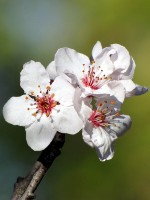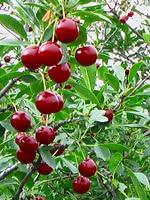Mon-Fri 9am - 5pm Mountain time
Western Sand Cherry vs Juliet Cherry
Prunus pumila var. besseyi
Prunus x kerrasis Juliet
NOT AVAILABLE THIS SEASON - MIGHT RETURN
Western Sand Cherry is known for its unique, leathery grey-green foliage and beautiful white blossoms. It is a popular ornamental shrub in parks and front yards. Both you and the wildlife will love its edible small dark red to purple cherries.
Due to its small stature and spreading qualities, Western Sandcherry is suitable as an underplanting or groundcover.
Many people graft plum and cherry varieties to Western Sand Cherry and use it as rootstock. It is also popular to graft hardy apricots to.
Juliet Cherry is a cold-hardy dwarf sour cherry. The deep burgundy fruit are known for being sweeter than other varieties, often considered one of the sweetest dwarf sour cherries. They are well suited to fresh eating, baking, and preserves. In the spring, beautiful white flowers cover the branches, adding ornamental value.
Juliet Cherry was developed at the University of Saskatchewan. It is recommended to grow dwarf sour cherries as a shrub rather than a small tree. The shrub form tends to bear fruit earlier and is less susceptible to winterkill.
Sour cherries are self-fertile; however, planting with additional varieties for cross-pollination can increase yields.

